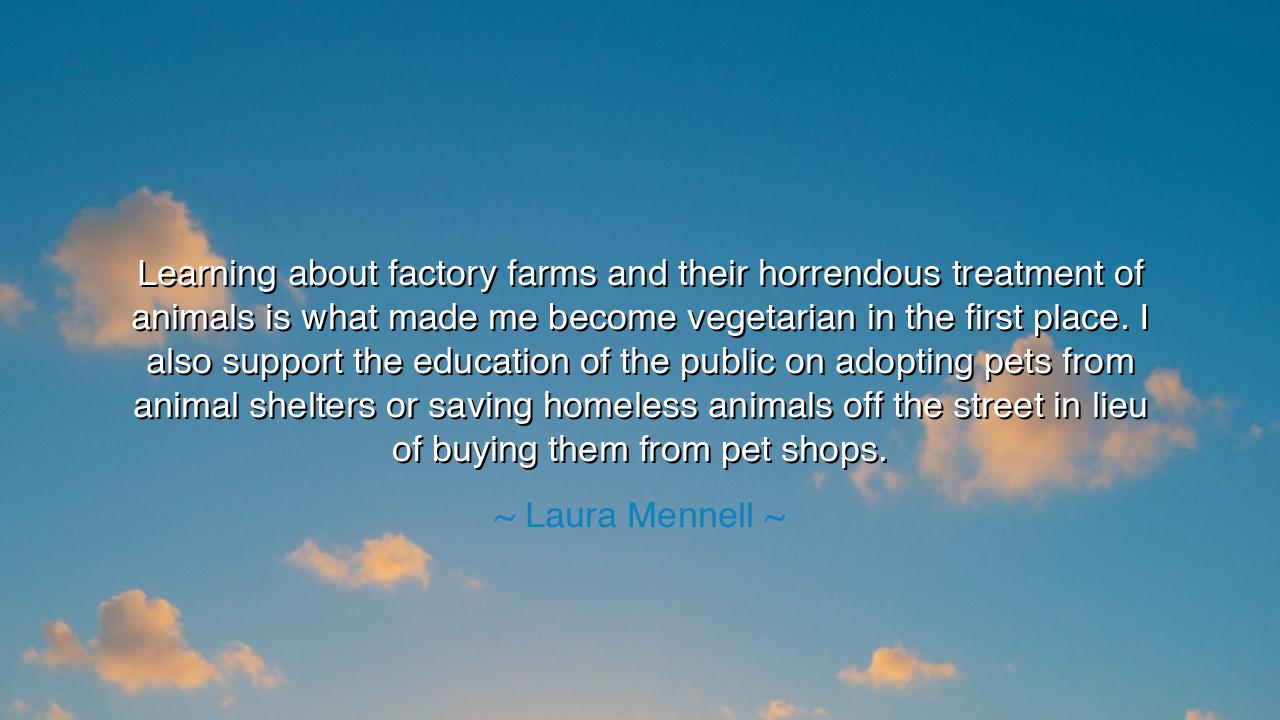
Learning about factory farms and their horrendous treatment of
Learning about factory farms and their horrendous treatment of animals is what made me become vegetarian in the first place. I also support the education of the public on adopting pets from animal shelters or saving homeless animals off the street in lieu of buying them from pet shops.






Hear the voice of Laura Mennell, who spoke with compassion and truth: “Learning about factory farms and their horrendous treatment of animals is what made me become vegetarian in the first place. I also support the education of the public on adopting pets from animal shelters or saving homeless animals off the street in lieu of buying them from pet shops.” These words, though spoken in our time, carry the weight of timeless wisdom, for they remind us that the measure of our humanity is found in how we treat the most vulnerable.
The heart of her teaching lies in awakening—that moment when the eyes are opened to cruelty long hidden. The world of the factory farm, with its cages and chains, its disregard for life, reveals to us not abundance, but sorrow. When Mennell learned of this, she chose not silence, but action. She turned her plate into a vessel of mercy, and her voice into a call for change. Thus we see that the path of compassion often begins in the moment when the heart cannot look away.
The ancients, too, understood this. In the tale of Ashoka the Great, the Indian emperor once bathed his empire in blood through conquest. But when he witnessed the suffering he had caused, his heart was pierced. He renounced violence, embraced ahimsa—the principle of non-harm—and became a protector of both people and animals. Just as Mennell’s heart turned upon seeing the cruelty of farms, Ashoka’s soul shifted upon seeing the battlefield. From these stories we learn that true greatness is born when empathy conquers ignorance.
There is also in her words a call toward stewardship. To adopt from shelters, to rescue the homeless animal, is to affirm that every life has value, even those discarded by others. She rejects the vanity of buying life from a pet shop, where creatures are commodified, and instead exalts the dignity of giving refuge to the forsaken. This is no small act—it is the quiet heroism of kindness, the recognition that we are not owners of the earth, but caretakers.
Consider the story of St. Francis of Assisi, who walked among the creatures as brothers and sisters. To him, the sparrow was not lesser, the wolf not enemy, the lamb not possession. He saw in all life a spark of the divine, and so he cared for them as kin. Mennell’s words flow from the same spirit, urging us to see in the shelter-dog’s eyes, or in the stray cat on the street, not a burden but a brother waiting to be restored.
Thus, the teaching is twofold: first, to examine our habits, and to see whether they bring harm where mercy could dwell; second, to act as guardians, not consumers, of the lives entrusted to our world. To live with compassion is not weakness—it is strength, for it demands courage to resist the path of convenience, and to walk instead the road of responsibility.
The lesson for us is clear: awaken, protect, and act. Learn the truth of where your food comes from, and ask if it aligns with your heart. When you see a creature in need, do not turn away, but reach forth your hand. Choose compassion over cruelty, rescue over purchase, mercy over neglect. In these choices lies the making of a nobler humanity.
So let your action be this: examine your own life with courage, and let compassion guide your steps. Eat with mercy, adopt with kindness, live with reverence. For as Mennell teaches, every small act of care is a thread in the vast fabric of justice. And when woven together, these threads will cloak the world in dignity and love, where no creature is forgotten, and no life cast aside.






AAdministratorAdministrator
Welcome, honored guests. Please leave a comment, we will respond soon